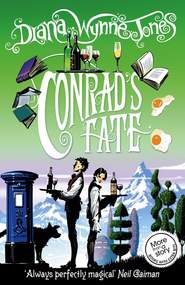По всем вопросам обращайтесь на: info@litportal.ru
(©) 2003-2024.
✖
Power of Three
Настройки чтения
Размер шрифта
Высота строк
Поля
“Oh, that,” said Hathil. “Yes, I do.”
After that Adara went home greatly comforted and worked hard to learn as much as she could. She grew up famous for her wisdom. Orban, on the other hand, grew steadily more unlucky. He broke his leg twice. When he was fourteen, he accidentally killed his best friend. When he was eighteen and had grown into a sulky young man with scraggly red hair, he fell in love with the most unpleasant woman on the Moor. Her name was Kasta. Many people thought it was the greatest misfortune yet, when Kasta married Orban. They had several children, but none lived to be a year old.
The bad luck spread from Orban to the rest of Otmound. Sheep died, hunting was bad and other food scarce. Otmound got steadily poorer. Outside, Dorig roamed in increasing numbers, and grew bolder and bolder. Otmounders soon dared not go out alone for fear of being pulled under water.
The bad luck spread from Otmound to the other mounds. There was fire in Beckhill and flooding in Islaw. And as Adara, for all her learning, could not learn how to lift the curse, it went on spreading, so that long before Ayna, Ceri and Gair were born, even the Giants were affected.
chapter two (#ulink_f80d74b5-7a90-56eb-a88c-dbfd3b88a8c1)
Ayna, Gair and Ceri were born in Garholt. Their father was Gest, who was a hero. This is how Gest became famous.
Garholt was on the south of the Moor, not far from the other end of the old Giants’ road. It was the largest of all the mounds and by far the most prosperous. While Chanters and Wise Women all over the Moor were shaking their heads and wondering what could be causing the growing bad luck, for many years the curse seemed to pass Garholt by.
Garholters – rather unwisely – prided themselves on their luck. They had gold, wool and hides in plenty; salt, fuel and wine. Their sheep were more numerous and in better shape than any on the Moor. Their honey was famous. Indoors, the houses were roofed with stone, and the five wells, round and stone-roofed like the houses, had been made safe from Dorig and from every other danger. The walls of the mound, below the big windows, were hung with tapestries embroidered in dark, bright colours. And Garholt could, in a quarter of an hour, muster more than a hundred of the fiercest and best-armed fighting-men on the Moor – not to speak of equally warlike women and children.
But this took a good, careful Chief to maintain it. Gart, the old Chief, was just such a one. But he died quite suddenly, and his two sons were killed the same night. Hearing their father had been taken ill, Gart’s two sons were hurrying home from hunting, using one of the new Giants’ roads for speed. This was unwise of them. As the curse had affected the Giants too, they had grown fewer, but those few had become very violent and untrustworthy. While Gart’s sons were hurrying along the road, a Giant caught and crushed them. So, as Miri the Beekeeper’s wife, who was a Wise Woman, pointed out, the bad luck came to Garholt after all and left it without a Chief.
That was how Gest came to be Chief in Garholt. He was old Gart’s nephew and lived in the much smaller mound of Islaw. Messages were sent to Gest at once, but the Garholters were very much afraid he would not be the good, careful Chief they were used to. Islaw people had a name for being queer and shifty – though, of course, no one in Garholt would have dreamt of calling them half-Dorig the way the Otmounders did. Still, Islaw people were known to be different. And Gest’s Islaw father had been a Chanter, who were odd people at the best of times. Then it was learnt that Gest was bringing his own Chanter, a man called Banot, with him. From being dubious, the Garholters became indignant. Weren’t the Garholt Chanters good enough for Gest? Or what?
When Gest arrived, everyone was relieved to find him fair, handsome, jolly and not at all peculiar. He was a big man, as a Chief should be, and obviously a seasoned fighter. Nor did he seem particularly clever. The Chanter, Banot, though his thin face had the dreamy look of his profession, seemed to have no harm in him either. It soon became clear that Gest had brought him simply because he and Banot were bosom friends. The Garholters all heaved sighs of relief and began to manoeuvre Gest into marrying Tille, the granddaughter of old Gart.
Nothing came of that. Gest was nice to Tille – as he was to everyone – but it was Banot who fell in love with Tille and married her.
Gest had not been a month in Garholt, when a messenger arrived from Og of Otmound. Og greeted the new Chief and wanted a band of fighting-men from Garholt at once to help him fight the Dorig. Hearing this, Gest smiled, a wide, jolly smile. Banot, who knew that smile, looked apprehensive. But the older and more responsible Garholters, who did not know it, took Gest aside and gave him the benefit of their advice. They did not know then that Gest was a hero.
“See here,” said the oldest Chanter, “Og has no right to take that tone with you. He may be the senior Chief, but we’ve made no treaty with him. Send me back to say No.”
“He’s giving you orders because he can’t afford to pay for our help,” said the goldsmith. “But we Garholters have our pride.” He looked round, with satisfaction, at the gold glimmering on people’s necks and wrists.
“I’ll say No very tactfully,” said the Chanter.
“Why is he so set on fighting the Dorig?” Gest asked.
“It’s the natural order of things,” Miri, the Beekeeper’s wife, told him. “Men against Dorig, Giants against men.”
“They say the only good Dorig is a dead Dorig,” added the oldest smith.
The Beekeeper, who always had news, said, “The Dorig have been pulling their people and sheep under water for years. A while back, they took to waiting outside Otmound in their own shapes and attacking anyone they met. Og warned everyone who went outside to carry a thornbush against them, but Dorig don’t seem to be afraid of thorns the way they used to be. Their latest trick is to pretend to be game when the Otmounders are out hunting: let a man chase them, then shift to their true shape and kill him. You know their crafty ways.”
“Well, no,” Gest said apologetically. “I’ve only met a Dorig once and it ran away before I could speak to it.”
“Then you have a lot to learn,” said the smith.
Gest smiled again. “I know I have. That’s why I think I’d better go over the Moor and talk to Og.”
To the consternation of all Garholt, this is just what Gest did. He sent Og’s messenger back to say he was coming and then prepared to set out himself, with only Banot for company. Everyone implored him to consider. They reminded him there was no one to be Chief after him. They said, if he must go, he should take twenty good men with him to protect him from Dorig. They told him fearsome tales about the way the Dorig sacrificed their victims and hung them up to the Sun.
Gest attended to none of it. He was quite pleasant, but completely firm. The Garholters discovered that their new Chief was the most obstinate man on the Moor. They respected him greatly for that, but it made them all the more anxious to have him safe back again. They took Banot aside and made him promise to see Gest was safe.
“I’ll do what I can,” said Banot. “But you don’t know Gest.”
They had to be content with that. Everyone anxiously watched the two set off along the line of the old road. The early Sun glinting on the gold collar of each was the only bright thing about them. Their clothes and weapons were dull and serviceable. Banot’s harp was shut in a dingy travelling case, so that it would not catch the attention of Giants. When the two had disappeared into the mists, the Garholters retired to the mound and spoke words for their safety. Then they waited.
Two days later, to their dismay, Banot came back alone. He was vague-eyed and abstracted, and Tille was the only one who was wholeheartedly glad to see him. The rest crowded round him, demanding to know where Gest was.
“In Otmound, I suppose,” Banot said vaguely. “He sent me home.”
Though they were all relieved to hear Gest was still alive, they wanted to know what Og had said, why Banot had been sent back, and what Gest was doing.
Banot seemed tired. “Gest always does things his own way,” was all he would say. “Someone bring me a drink.”
Miri, the Beekeeper’s wife, hurried up with beer, hoping it would loosen Banot’s tongue. Tille helped him take the harp off his back. The case came open as she did so, and she noticed that one of the harp strings had broken. It had been replaced by a queer pale length of gut, which gave off a strong smell of glue.
“Where did you come by that peculiar string?” she said.
“Oh that – I had to take what I could get,” said Banot. He drank some beer, seemed to recover, and began to laugh a little. “I’ve been singing and playing and talking for hours,” he said. “I’ve no voice left and I ache all over.”
“Was this in Otmound?” said Tille, glad to hear things were so merry there.
Banot shook his head. “No. By the roadside. We met some friends, Gest and I, while we were on our way – no one you know, but great fellows – and I stopped over with them on the way back.” He laughed. “The best of friends.”
“But when is Gest coming?” everyone wanted to know.
“In a day or so,” said Banot, yawning. “If he comes at all. And he may be in a hurry.” With that, he laughed and yawned and staggered off to sleep, leaving no one much the wiser. Nor would he say any more the next day.
Gest arrived in the middle of the following night. The first anyone knew of it was when Gest turned and shouted the words that sealed the main door against enemies. Startled by the shout and the thump of the door, people scrambled from their beds. Someone had the sense to raise the light, whereupon everyone stared in amazement. Gest had brought with him a beautiful young woman, tall and pale, with hair as black as peat. Both of them were splashed with mud to the eyebrows and almost too much out of breath to speak. Gest no longer wore his golden collar. The woman, on the other hand, wore a collar richer and more intricate than anyone in Garholt had seen before in their lives.
“Speak the rest of the doors shut!” Gest panted to the first person to arrive.
The boy scampered to do as he was told. The rest crowded up, shouting, “Why? Is it Dorig?”
Gest had used up all his breath and could only shake his head. The young woman shyly answered instead. “It’s my brother, Orban. I’m Og’s daughter, Adara.”
This caused gasps and murmurs. It was well known that Og loved his daughter more than he loved himself. Adara was said to be the most beautiful woman on the Moor, and the wisest who ever lived. And it looked as if Gest had carried her off.
“War,” said the Beekeeper gloomily. “This means war.”
“Doesn’t,” said Gest, still very short of breath. “Did three tasks for her. Marry her tomorrow. Got to rest now. Get a feast ready.”
“Just like that!” Miri said indignantly, as she and Tille led Adara off to Tille’s house to rest. “Does he think we can have a feast ready in five minutes?”
“Of course you can’t,” said Adara. “I don’t suppose he thought. I’ll go back and tell him to put it off, shall I?”
This of course put both Tille and Miri on their mettle. “You’ll do no such thing!” said Tille. “We’ll manage.”
“Besides, if he’s carried you off, it’s not proper to wait,” said Miri.
“He didn’t carry me off. I came of my own accord,” Adara protested.











